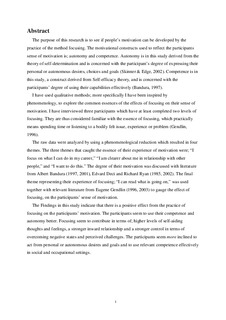| dc.description.abstract | The purpose of this research is to see if people’s motivation can be developed by the practice of the method focusing. The motivational constructs used to reflect the participants sense of motivation is; autonomy and competence. Autonomy is in this study derived from the theory of self-determination and is concerned with the participant’s degree of expressing their personal or autonomous desires, choices and goals (Skinner & Edge, 2002). Competence is in this study, a construct derived from Self-efficacy theory, and is concerned with the participants’ degree of using their capabilities effectively (Bandura, 1997).
I have used qualitative methods; more specifically I have been inspired by phenomenology, to explore the common essences of the effects of focusing on their sense of motivation. I have interviewed three participants which have at least completed two levels of focusing. They are thus considered familiar with the essence of focusing, which practically means spending time or listening to a bodily felt issue, experience or problem (Gendlin, 1996).
The raw data were analyzed by using a phenomenological reduction which resulted in four themes. The three themes that caught the essence of their experience of motivation were; “I focus on what I can do in my career,” “I am clearer about me in relationship with other people,” and “I want to do this.” The degree of their motivation was discussed with literature from Albert Bandura (1997, 2001), Edvard Deci and Richard Ryan (1985, 2002). The final theme representing their experience of focusing; “I can read what is going on,” was used together with relevant literature from Eugene Gendlin (1996, 2003) to gauge the effect of focusing, on the participants’ sense of motivation.
The Findings in this study indicate that there is a positive effect from the practice of focusing on the participants’ motivation. The participants seem to use their competence and autonomy better. Focusing seem to contribute in terms of; higher levels of self-aiding thoughts and feelings, a stronger inward relationship and a stronger control in terms of overcoming negative states and perceived challenges. The participants seem more inclined to act from personal or autonomous desires and goals and to use relevant competence effectively in social and occupational settings. | nb_NO |
